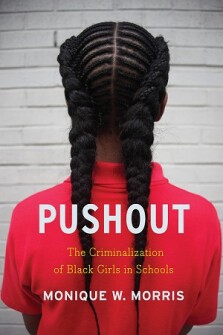When it comes to the treatment of black girls in schools, the headlines should, unfortunately, sound familiar: a six-year-old girl handcuffed in her kindergarten classroom in Georgia, viral videos of a high school student violently arrested in South Carolina, and a 12-year-old 6th grader slammed to the ground in Texas.
But Monique W. Morris, co-founder and president of the National Black Women’s Justice Institute, wants to remind educators and policymakers that these incidents are just glimpses of a larger problem in education. For her recent book Pushout: The Criminalization of Black Girls in Schools (The New Press, 2016), she interviewed black girls across the country—many of whom had been arrested, suspended, expelled, or funneled into the juvenile justice system—to share the stories that don’t make the news.

I spoke with Morris for Education Week’s news and opinion series “Beyond Bias: Countering Stereotypes in Schools” recently about how schools marginalize black girls and the ways educators can shift school culture and climate. The opinion side of the series also includes video interviews with researchers Adrienne D. Dixson; Shaun R. Harper; Bettina L. Love; and Terri N. Watson; as well as an essay by Rebecca Epstein, the executive director of the Georgetown Law Center on Poverty and Inequality, with whom Morris is currently working on a two-year project to speak with girls of color and school resource officers. Morris is well-known for her education, civil rights, and social justice work.
The girls’ testimonies in Pushout signify a deeply complex school climate—one rife with racial and gender bias and disciplinary policies that work in tandem to disproportionately turn out black girls from the public K-12 classroom, Morris explained in my Q&A with her. Generally, the discussion and the research on the overdisciplining of students of color has focused on black male students. It is only recently that researchers have moved to specifically focus on girls of color.
As these school conditions are given fuller context by researchers like Morris, Dixson, Harper, Love, and Watson, questions linger about how best to move schools along. In a review of Pushout for the Washington Post, Marcia Chatelain, associate professor of history and African-American studies at Georgetown University, stressed the importance of the book for teachers, school administrators, and policymakers, “whose decisions—big and small—shape how black girls learn and live.”
The central argument of Pushout is: Listen to how black girls feel marginalized and the reasons why. If schools can reexamine discipline and classroom management with a particular awareness of the role that stereotypes of race and femininity can play in their relationships to students, perhaps, Morris says, they might start to hear what the students have to say.
Check out the full Q&A and listen to the audio here.
Photo credit: The New Press